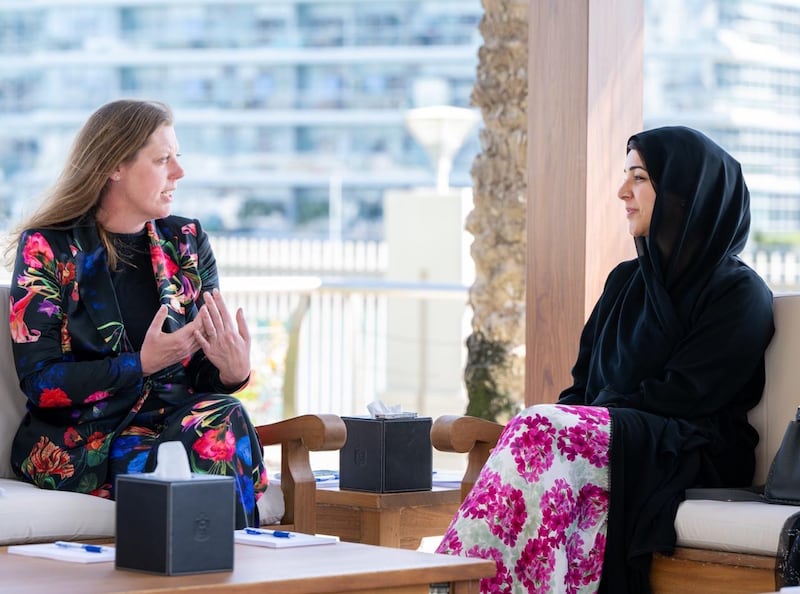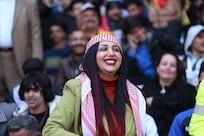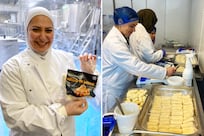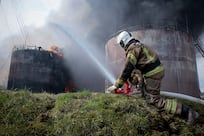Live updates: Follow the latest news on Israel-Gaza
The UAE has partnered with NGO World Central Kitchen as both express a commitment to avert a famine in Gaza and to maintain life-saving aid to the Palestinian people. As part of that effort, the UAE and World Central Kitchen, an NGO launched by Spanish-American chef Jose Andres, are delivering aid via a maritime route and in co-ordination with the US, EU and Cyprus, with the first ship carrying 200 tonnes of food setting sail from Cyprus on Tuesday.
Reem Al Hashimy, Minister of State for International Co-operation, said: “The operation is to avert famine in north Gaza ... what can we do to bring in enough so we are not seeing people starve to death.”
Speaking to The National in a joint interview, Ms Al Hashimy and the chief executive of World Central Kitchen, Erin Gore, both spoke of the absolute necessity to avoid a famine in northern Gaza. Ms Gore, who was visiting Abu Dhabi as part of her co-ordination with the UAE, said: “I cannot sleep at night, knowing we are not trying. I believe the greatest failure is to do nothing at all.” There is ample understanding that this mission alone is not sufficient and both Ms Al Hashimy and Ms Erin stressed the need for all those who can to get involved and send aid.
The UAE has not previously worked with World Central Kitchen, but Ms Al Hashimy said the organisation “has really raised the bar in delivering in crisis situations in general and this was an opportunity” to tackle the situation. The initial meeting between the two sides began only last month and within days efforts were made to make this a workable solution.
Ms Al Hashimy said: “We don't want to do a big media stunt. This is really about helping people in the north … let's just stay focused on how we're going to help people in the north and not do something gimmicky.”
There is a whole set of complexities that needs to be addressed to get the ship to Gaza, particularly ensuring safety for aid recipients and aid workers, and getting Israeli approval. Organisers are being careful not to speak about the details of how approvals are attained and the political manoeuvring needed to ensure the success of the mission.
Ms Gore said that what brought the UAE and World Central Kitchen together was that “we are so focused on action … it takes courage and an openness to try new things to adapt, to fail, but learn from failure to improve every single day”.
World Central Kitchen has been working in southern Gaza through a local aid distribution partner Anera and has worked with them in past wars. However, Ms Gore said that “nothing has been at the level of the scale as to where we are now”.
Ms Gore stressed that her organisation works with local chefs and local partners, “we work with the community, we hire the community”.
First aid ship leaves Cyprus for Gaza
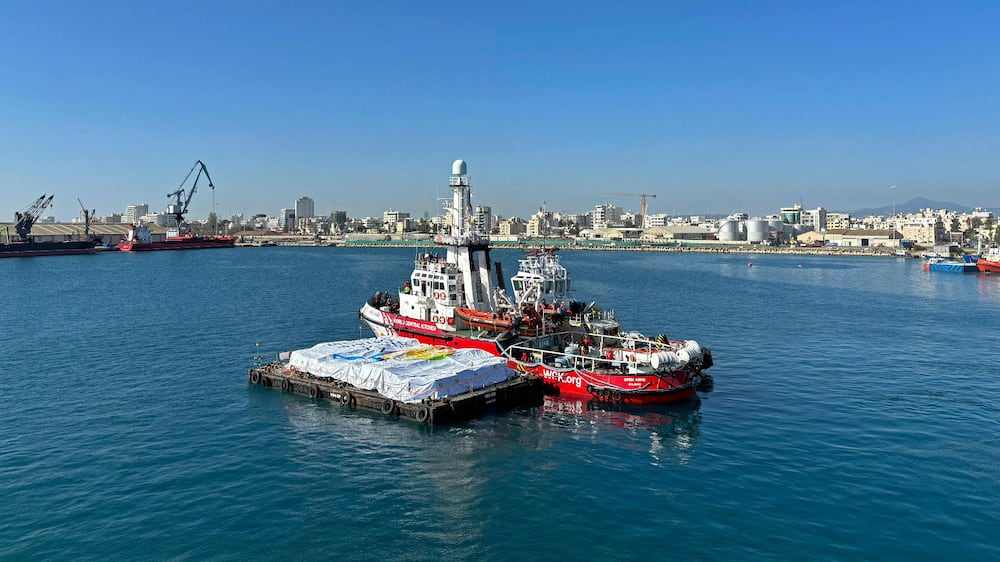
Not a replacement for land borders
Both were keen to highlight that the maritime border should not be considered a replacement for the necessity of opening up the land borders.
Ms Al Hashimy said: “The maritime corridor was designed for it to be a constant supply in, as an additive to all of the other necessary entry points, which we also support. We want to see all the other entry points also open up. So it doesn't really replace anything ... the needs right now are so great that you need all of them as much as you can, and as quickly as you can.”
Ms Gore explained: “I want us to build a highway of constantly flowing aid on the sea as just one more access point into Gaza that is so desperately needed.”
The UAE has worked across a number of avenues to support Palestinians since the start of the war in October, including bringing thousands of injured and sick Gazans to the UAE for treatment, airdropping tonnes of aid into Gaza and setting up a field hospital inside the territory.
“We're still going to be doing airdrops, even as we're doing the maritime, even as land opens, until the needs are mitigated against,” Ms Al Hashimy said. She anticipates the need for aid will continue long after the war ends and the commitment to aid extends to it.
UAE opens prosthetic limb centre in Gaza to help wounded Palestinians
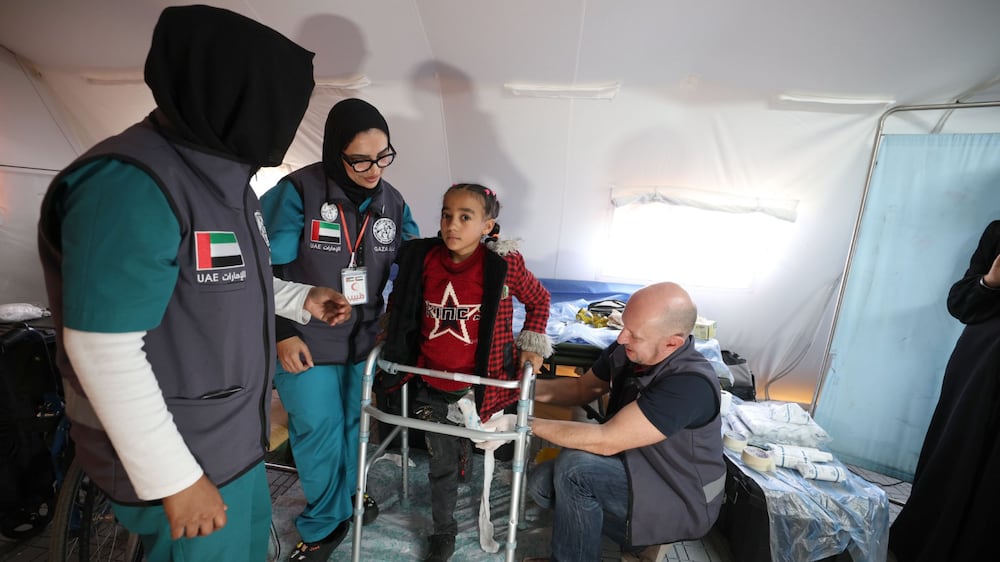
To date, World Central Kitchen has served more than 35 million meals in Gaza, has opened 60 community kitchens and plans to open at least 10 more. Four hundred Gazans have been hired and thus are getting income at a time that Gaza’s economy has imploded. However, Ms Gore noted: “There are thousands volunteering. If you walk into a kitchen, you probably see five or six chefs, but maybe 80 community helpers, because it's during disasters, when you see the worst of humanity, but also the best of humanity comes out.”
On how the UAE’s aid helps World Central Kitchen expand its work in Gaza, Ms Gore said: “I see it as an accelerator, as an escalator ... it is a partnership in the truest of essence … we are a non-profit organisation and we are also not a political organisation … and so there are limitations for every NGO,” which the UAE is now supporting. With the partnership with the UAE, Ms Gore explained that there will be “hopefully soon thousands of tonnes of aid being delivered by ship”.
When asked what her message was to the Palestinians, Ms Al Hashimy was visibly emotional and after pausing, said: “We are coming. The first ship is not the only ship,” she stressed.
Ms Gore concurred, saying: “The first ship arriving is just the beginning, the second ship is on its way … it is the beginning, it is part of something so much bigger, so much greater in ensuring continuous flow of aid into Gaza.”
Ms Al Hashimy called on people not to assume that the Open Arms arriving as the first ship was the most important moment. “That one moment is not the [most important[ moment, it is initially to make sure we are not dealing with famine at this point, very soon it will be dealing with disease, trying to make sure you have more access to clean water. It will evolve.” However, for the moment, the absolute urgency is “to sustain life ... people are dying of starvation, that cannot be”.
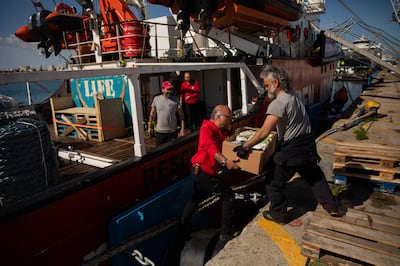
Focus is on ready-to-eat meals
The aid vessel, Open Arms, is carrying a floating raft packed with food such as flour, rice and canned chicken. To prepare the 200 tonnes of ready-to-eat meals, the World Central Kitchen had to execute a “challenging and complex” mission that involved a logistics team experienced in purchasing massive quantities of food, according to Ms Gore. “That is not normal for World Central Kitchen, we thrive in making hot meals,” she explained. But right now, the focus is on ready-to-eat meals because “the situation is incredibly dire, and when people get food in their hands, they need the sustenance, they need the nutrition, they need the nourishment”.
It's also pre-prepared food due to the absence of storage facilities and cooking gas, which led the World Central Kitchen to look for innovative solutions to assist people in heating their meals, including the use of wooden pellets and solar-powered packs, in collaboration with a Cairo-based company.
Ms Al Hashimy said: “The success of this partnership is that you would have never expected it in its speed, not in its scale, not in its ability to come in a very dire situation, and yet it's working.” She added that it has been a “mission-driven approach” that relies on continuous co-ordination and communication.
As truce discussions remained stalled, the hope was that the initial shipment of food aid would arrive in Gaza at the beginning of the holy month. Nevertheless, it was “less about getting it done before Ramadan and more about getting it done”, emphasised the UAE minister. “If Ramadan is about the absence of hunger, the absence of food, they've had no food for a while. If Ramadan is about the absence of family, many of them have lost their family. So if anything, maybe in Ramadan, it's less about food coming to them and more about they're not forgotten, that there is hope.”
The Pentagon this week sent military ships from the US East Coast to the Mediterranean, where American troops will help to install a temporary pier and dock to deliver more aid into the Gaza Strip. However, the mini-port will not be up and running until early May.
Ms Al Hashimy said the UAE supports the plan, describing the pier as “an important piece” and emphasising that “any entry point that is pre-approved of goods that are to reduce the suffering of the people would be a very good thing”.
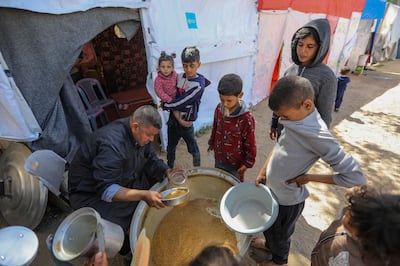
Action, action, action
The UAE stands out as a leading provider of aid to conflict and disaster-stricken countries across the region and beyond, including Yemen, Syria, Ukraine and others.
In this operation, Ms Gore described the UAE’s involvement as broad, including “logistical, a thought partnership, a brain trust that is coming together with the shared mission to get as much food to Gaza as possible. What ships do we have? Who has a crane? Who has 100 tonnes of food? Where is it? How can we put your 100 tonnes of food on the same ship as World Central Kitchen? It truly is a brain meld, a mission meld, really focused on action, action, action.” There has been an effort to find vessels capable of making deliveries, which has meant partnering with others, with speed in action.
Ms Al Hashimy highlighted the need for agility and quick action: “Sometimes smaller groups can move faster than larger institutions that are heavy on bureaucracy ... solutions exist in places of imagination.” She added: “It is always hard but there are ways around it ... we wanted the same thing, to reduce human suffering and to reduce it as quickly as possible.”
“It's nonstop, it's all day. It's every day and that is the urgency of the situation and decisions are made quickly,” Ms Gore added.
For Ms Al Hashimy, who has been involved in many aid operations and projects, this was the hardest mission of all. She explained: “This is a different universe in terms of the scale of complexity and danger, the difficulty of access and the dire situation. And this is all happening while you also have negotiations on hostage release and ceasefire. So it's almost the worst time for us to try to do something, but also the only time.”
“This is the hardest thing I've ever seen, really,” stated Ms Al Hashimy. “And also the most painful that I've ever seen in my life. And I don't know if it makes me more prepared for anything else. But it's definitely one that I know has changed me as well.”
